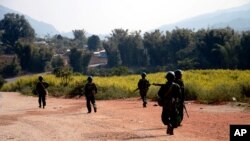Fighting has flared in areas of Myanmar controlled by ethnic rebels who refused to sign a cease-fire, raising fears the army is pressuring groups that did not join in what was supposed to be a crowning achievement of President Thein Sein's five-year term.
The United Nations and the United States have called on the military to de-escalate the tension, stressing that the groups, such as the Kachin Independence Organization operating on Myanmar's northern border, should not be pressured but seen as partners essential to achieving a lasting peace.
The army clashed with the Shan State Army-North, one of the ethnic armed groups that did not sign the deal, 37 times between October 6 and 19, military-run newspaper Myawady said this week.
Seven SSA-N members were killed and the army suffered an unspecified number of casualties, the paper said.
"We made a point that it's important the government and military show some restraint in those areas where groups did not sign the cease-fire," Ben Rhodes, the U.S. deputy national security adviser, told reporters in Yangon on Tuesday.
Tense talks between the rebels and the government unraveled after two years of grueling negotiations, with only eight of more than a dozen major groups signing the peace accord last week.
Blow to president
This was a blow to Thein Sein, who has made an all-encompassing cease-fire his top priority, as well as the ruling Union Solidarity and Development Party (USDP) which is facing stiff competition from Aung San Suu Kyi's National League for Democracy (NLD) in the Novemver 8 election.
"There's a danger that if that escalates, that can be interpreted as putting pressure," Vijay Nambiar, an adviser on Myanmar to the Secretary General of the United Nations, Ban Ki-moon, told Reuters.
"The fact is that there are some groups who still have problems to resolve with regard to how to move forward and that has to be respected," said Nambiar.
A government spokesman was not available for comment.
A senior official from the Shan State Army-North sent a letter to vice president Sai Mawk Kham on Wednesday, requesting him to help stop the military's offensive.
"We humbly request the immediate halting of the military operations near the SSPP/SSA headquarters," said Sao Khur Tai, one of the leaders of the group, in the letter.
The Arakan Army, an ally of the powerful Kachin Independence Army, which also did not sign, said on Tuesday the military had been purposely increasing its presence in the areas held by the groups that did not sign the cease-fire.
Nambiar said the U.N. recognized the concerns of the non-signatories and that they should be sorted out peacefully.
He said he believed the cease-fire had a "historic potential" to bring lasting peace to the country.
"There's an agreement on the steps forward and everyone has made huge endeavors to make it happen, including the non-signatories," said Nambiar.
"We still see everyone as a part of this process."





